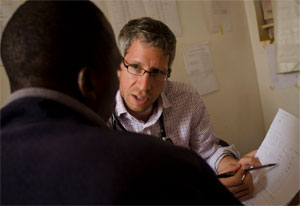Profile: Fogarty Fellow Dr Mark Siedner adapts medical practices in Uganda
May / June 2013 | Volume 12, Issue 3

Fogarty Fellow Dr. Mark Siedner is studying better
ways to bring care to those who need it in western
Uganda.
By Arthur Allen
For many patients in Mbarara, Uganda, the most important medicine dispensed by Dr. Mark Siedner and his colleagues may be the text message stating that their blood test results are abnormal.
The message lets patients know that their lives may depend on a return visit to receive care from clinicians - and that's more than a simple courtesy. In resource-poor countries like Uganda, patients may live dozens of miles from the clinic and require a month of work to earn carfare. Patients who know they are ill and need to start antiviral medicines are more likely to make the decision to come back to the hospital for treatment, especially now that the drugs are widely available, Siedner says.
Transportation costs are a major obstacle to medical care across sub-Saharan Africa, contributing to the loss of up to 40 percent of patients to follow-up after a positive HIV test. Many of those who don't return will die of AIDS, often after infecting other people.
For Siedner, an infectious disease fellow at Harvard and a 2011 participant in Fogarty's Global Health Program for Fellows and Scholars, bringing care to people in marginalized populations is about finding the true determinants of health and conducting research to find better ways of getting around obstacles.
"Most paradigms for medicine have been based on what's accepted in the West and transferring it," he says. "But maybe we can leapfrog some of the dogma we use here and think about how novel technologies can serve those in resource-limited settings."
In Uganda, he and his colleagues are investigating whether there's a better way to inform patients of their CD4 counts - a key marker for progression of AIDS - than requiring a notification visit. An ongoing study, funded by his Fogarty award, has looked at the practicality and ethics of using cellphone texts to advise patients about the gravity of their HIV status. A 2012 study found that most patients at the hospital own or have access to cellphones and are enthusiastic about using them to get results.
In a follow-up study, Siedner and colleagues are testing three different messaging techniques that offer a range of privacy assurance and convenience. "It costs 2 cents to send a text message and $5 to cover their transportation. That's only one part of the equation, but we think it's an important one," says Siedner. Fewer than 20 percent of patients at the hospital return within seven days of an abnormal test result presently, and mortality rates are as high as 10-20 percent in the first year of HIV care, compared to less than 3 percent in the West.
Siedner, whose mentor at Harvard's School of Public Health is Dr. David Bangsberg, was able to hire two full-time research assistants with his Fogarty support. The student she mentored in Mbarara have submitted five academic talks or papers to journals and conferences, and he meets with five to ten local researchers and medical residents during each visit.
At a time of dwindling resources for health research in the developing world, Siedner says, Fogarty's assistance has been key. "My ability to participate in everything from research to clinical care in Mbarara, being mentored myself and mentoring others, has really set me on a trajectory to pursue my career goal of being an academic clinician focused on doing research in places like Uganda."
More Information
To view Adobe PDF files,
download current, free accessible plug-ins from Adobe's website.